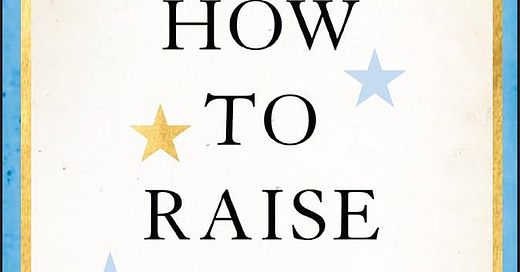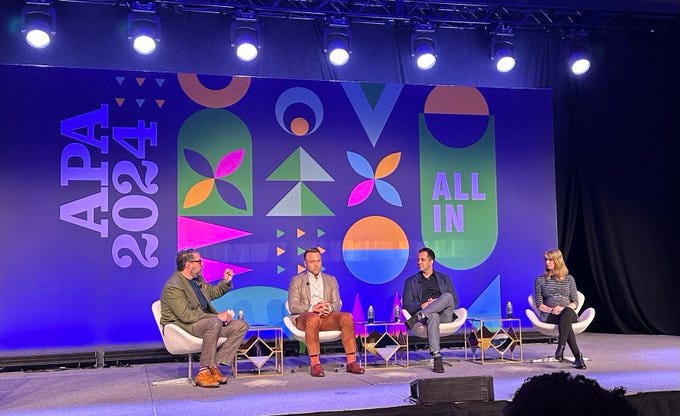How to Raise a Citizen (And why its up to you to do it) with Lindsey Cormack
Issue 131: An important book on how to increase civic engagement in youth
As the presidential election is coming up in an era where civic engagement is increasingly vital, Dr. Lindsey Cormack’s new book, How to Raise a Citizen (And Why It's Up to You to Do It) serves as a guide for parents navigating the complex landscape of politics with their children. Lindsey is an Associate Professor of Political Science at Stevens Institute of Technology and she draws from personal and professional experiences to address the often-overlooked responsibility of parents to equip their children with the knowledge and skills to be an active citizen.
Her book speaks directly to an America in which civic knowledge is alarmingly sparse and many people dread politics. It's a tool for parents, educators, and anyone eager to fill this gap. This was inspired by her own experiences raising kids and teaching college students who lacked a basic understanding of being an engaged citizen.
Over the years, I consulted numerous parenting "how-to" books on everything from establishing sleep routines to handling tantrums and teaching reading skills. However, I noticed a gap in our guidance for parents: there was little on preparing children to be active, engaged participants in democracy.
The book challenges the common assumption that schools alone should shoulder the burden of civics education. Because they prioritize other subjects required for college preparedness, it has resulted in generations of young adults ill-prepared to engage in the political system that governs their lives. Lindsey argues that parents must step in to fill this void. Read our interview with Lindsey below and learn more about How to Raise a Citizen here.
What does your book teach us about social identity or group dynamics?
How to Raise a Citizen (And Why It's Up to You to Do It) explores how individual identities and collective dynamics shape our interactions with the political sphere. Younger individuals tend to go through school systems not aimed at teaching civics in a robust or fundamental way meaning that our collective understanding of politics and government suffers.
The book argues that families and adults responsible for contributing to raising children have to change the common narrative on politics (i.e. that it’s all negative and self-serving) as well as be willing to change the communication dynamics of talking about politics by making sure kids get to practice these things before the leave the home. One of the key points I address is the role of parents in helping children recognize and try to understand different perspectives within their communities.
What is the most important idea readers will learn from your book?
The most important idea that readers will learn is the role that parents must play in filling the civics education gap left by modern schooling systems. Our politics won’t feel or function better if we don’t change something in how we teach our children about politics and government in our homes. No one else is coming to save us, and the states all have very different systems for how and when to introduce civics, we’ve got to start seeing this as a parenting responsibility.
Why did you write this book and how did writing it change you?
"How to Raise a Citizen (And Why It's Up to You to Do It)" was inspired by my personal experiences as both a parent and an educator. Over the years, I consulted numerous parenting "how-to" books on everything from establishing sleep routines to handling tantrums and teaching reading skills. However, I noticed a gap in our guidance for parents: there was little on preparing children to be active, engaged participants in democracy. This gap became even more apparent in my role as a professor teaching introductory U.S. politics to college students. Whether fresh out of high school or preparing to graduate, many of my students lacked basic civic knowledge. They were unfamiliar with voting processes, the Constitution, and the structure of government that impacts their daily lives. This isn't a failure on any individual's part but a collective oversight in our educational and societal norms.
The turning point came when elementary schools began asking me to develop civics lessons. Engaging with younger students highlighted the need for a resource that could help parents bridge this educational gap. My book aims to equip parents with the tools to discuss government and politics in ways that are both enjoyable and enlightening, encouraging a deep, familial approach to civic engagement. Through writing this book, I've realized yet another responsibility that parents have to shoulder, but I came to the conclusion that it will be up to families to right the way our politics feels right now.
For two years, I collected and analyzed data on civic instruction and youth knowledge and participation. My team of 5 research assistants and I also interviewed a lot of teachers from across the US. The situation is more dire that I thought, schools are teaching less and less on the subject, and trust in our institutions is decreasing. But in many ways, I’m hopeful – we have so much room to grow, and I truly think our politics will be able to function better as more and more people see it as a benefit to be informed of how things work and to do that work with their children. This process has not only enriched my perspective as an educator but has also deepened my commitment to doing all that I can to promote civic-know how for the coming generations.
What will readers find provocative or controversial about your book?
Early readers have been shocked about how little civics instruction school kids get today. They have been surprised that there are no national standards and that of all the AP courses administered in high schools, AP US Government is the 4 lowest scoring exam on average. In fact, most of the students who sit for the exam earn the equivalent of a failing grade. I think parents are frustrated by this information because many think schools will prepare students to be active citizens, in reality that’s just not the case. Young voters are the least likely to be registered, the least likely to vote, and that means they don’t get a fair say in our politics.
Do you have any practical advice for people who want to apply these ideas (e.g., three tips for the real world)?
Yes, totally. For those with young kids under 10 there are three important things parents can do.
Take your kids to vote with you so they can see the process.
Second, let them see you talking about politics with other people.
Third, do not just focus on the negative aspects of politics and government. We shape the way kids dream, and if we continue the narrative of “all politicians are bad” we will continue to alienate kids from this space. For those with 10-14 year olds, start practice having political conversations with your kids. Make sure that kids have opportunities to learn some of the vocabulary around politics and government. I also recommend introducing kids to local and state politicians to humanize what we mean by “the government”. For those with 15-18 year olds all of the above apply, especially on practicing how to have hard conversations.
I also think kids MUST know these 4 things to enter adulthood with the power to participate in meaningful ways:
Understand the Importance of Voting: Every citizen needs to know how to register to vote and keep their registration current. Since the rules can vary widely from state to state, it’s necessary to stay informed about local voting requirements – and that’s something parents need to let kids know about
Recognize the Difference between Primaries and General Elections Primary elections, in many places and for many offices, can be more pivotal than the general election – yet primary turn out is always lower than general elections. Knowing this and the rules on participating in primary elections is necessary
Constitutional Knowledge: A basic understanding of the government's structure, the separation of powers, and constitutional rights is essential. Once kids grasp these concepts, much of what is debated in the media begins to make more sense—and becomes less infuriating. I suggest everyone should read the constitution through at least once in their lives.
Federalism: Recognizing that politics extends beyond the oftentimes divisive national stage into state and local issues can make things more concrete and far less daunting. State and local governments play a big role in our daily lives. Understanding federalism—how power is divided between national and state governments—empowers kids to effectively address issues in their community because they can have a better understanding of who is responsible for what.
News and Updates
We surpassed 5,000 total subscribers on our newsletter this month! Thank you for your continued interest and support for our work—we have lots of exciting new content planned for this fall. So stay tuned as we debunk some of the biggest myths in social psychology, including the Milgram Obedience studies, Stanford Prison Experiment, and Asch Conformity studies!
Jay discussed The Psychology of Identity and Fostering Social Harmony with Scott Barry Kauffman on The Psychology Podcast this week. They discuss how to escape your echo chambers and overcome your biases, the role social media plays in creating a funhouse mirror, and how to make connections with fellow humans even if they're in your out-group.
Jay was also at APA for a panel discussion on the psychology of misinformation and discuss with Charles Duhigg about how to write engaging popular psychology books.
Catch up on the last one…
Last week, Todd Kashdan of
shared a guide with seven rules to effective dissent. Use these tips in the workplace, team setting, or in the classroom.







